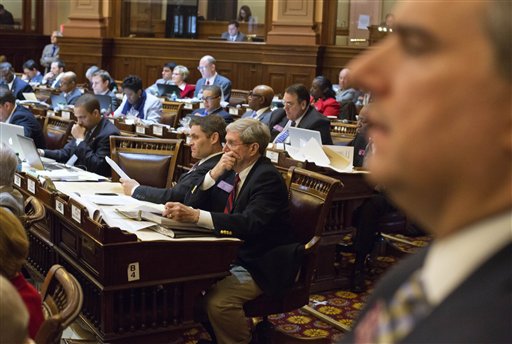Georgia lawmakers debate legalizing medical marijuana
Monday, March 3, 2014
 Lawmakers listen to debate on a bill that would legalize medical marijuana in Georgia for patients with certain illnesses on the House floor, March 3, 2014, in Atlanta. The House voted 171-4 on Monday to approve the proposal ahead of an important legislative deadline. It now heads to the state Senate.
Lawmakers listen to debate on a bill that would legalize medical marijuana in Georgia for patients with certain illnesses on the House floor, March 3, 2014, in Atlanta. The House voted 171-4 on Monday to approve the proposal ahead of an important legislative deadline. It now heads to the state Senate.ATLANTA - Patients diagnosed with certain illnesses could take a form of medical marijuana under a plan that Georgia's state legislators backed Monday ahead of an important deadline that sorts out which bills go forward and which will likely fail for the year.
Legislative rules force Georgia's state lawmakers to get their bills approved by at least one chamber of the General Assembly by what's commonly called "Crossover Day," or else those bills are unlikely to get to the governor's desk. That rule can be bent, but it is difficult.
Among the biggest debates was a plan to let people suffering from the side effects of cancer treatment, glaucoma and some seizure disorders to take products derived from cannabis oil in the hope it will ease their symptoms. House lawmakers voted 171-4 to approve the bill. It now heads to the state Senate.
The cannabis could be given to patients orally as a liquid, a pill or through injections. State Rep. Allen Peake, R-Macon, the bill's sponsor, said the cannabis could bring relief for children who suffer from hundreds of seizures daily. He said cannabis oil is low in THC, the active ingredient that produces the marijuana high.
"It is not a slippery slope toward legalization of cannabis for recreational use," Peake said. "I stand firmly against that direction and will fight it with all my energy."
Several politicians acknowledged they were initially reluctant to change statewide drug policy during an election year, but Pike urged them not to delay by setting up study committees or holding the bill until next year.
"We cannot move fast enough," he said.
Janea Cox hugged her daughter, Haleigh, during the vote. Her daughter has up to 100 seizures daily, and she had lobbied for the legislation.
"We are all so overwhelmed right now," Cox said, crying. "We had so much support in there I can't imagine it not passing. It's crazy to be a part of history. I think we're all in shock right now."
There were skeptics. Rep. Sharon Cooper, chairwoman of the Health and Human Service Committee, voted for the proposal but cautioned that it is flawed. Cooper said research colleges that provide medical marijuana under the proposed law could lose federal funding and their officials could be prosecuted.
In the Senate, lawmakers approved a bill that says health insurance policies available through Georgia's federally run insurance exchange can't fund abortion. The Republican-dominated chamber voted 35-18 to approve the restrictions, a step supporters said two dozen other states have already taken. Democratic lawmakers opposed the bill, saying it infringes on a woman's right to choose.
As the day progressed, House lawmakers voted 173-3 to approve placing a statue of slain civil rights leader Martin Luther King Jr. on the Capitol grounds or in another prominent location. While the bill passed by a wide margin, honoring King has been politically controversial in past years. Former Gov. Lester Maddox refused to shut down state government when King was assassinated. A portrait of King hangs in the Statehouse, but the grounds also host portraits and monuments of politicians who supported segregation.
Other issues remain unresolved.
For example, a proposal to regulate companies that allow people to order a ride using their cellphones had not been scheduled for a vote, meaning it was at risk of collapsing this year. Those regulations were supported by existing limousine companies, but they were opposed by ridesharing companies including Uber. Rep. Wendell Willard, R-Sandy Springs, said he expected a proposal to tighten the rules under which police and prosecutors can seize property and cash would fail after it was opposed by law enforcement officials.
